ISRAEL-GAZA BORDER — Clutching suitcases and foreign passports, on stretchers and in strollers, civilians gathered in the hundreds Wednesday to cross through the Rafah border into Egypt. They were the first to make it out of the Gaza Strip since Hamas’ surprise terrorist attack and the ensuing Israeli bombardment and siege on the Palestinian enclave.
One man, his leg apparently amputated, said goodbye to his loved ones, accepting their kisses on his cheeks and forehead. A young boy cried in pain, his leg wrapped in bandages and encased in a metal brace, waiting to be transported for urgent medical care on the other side.
While dozens of people were loaded into ambulances, crowds at the border facility pushed through an open gate. Parents gripped tightly to toddlers with one hand and tried to wheel their suitcases with the other.
Then they sat in plastic chairs, waiting and waiting after weeks of false dawns.
Many foreign passport holders have lingered near the border since the first days of the war, pushed south by Israeli orders and drawn there by promises that the crossing might open for them to evacuate.
But the gates never opened to civilians — until today.
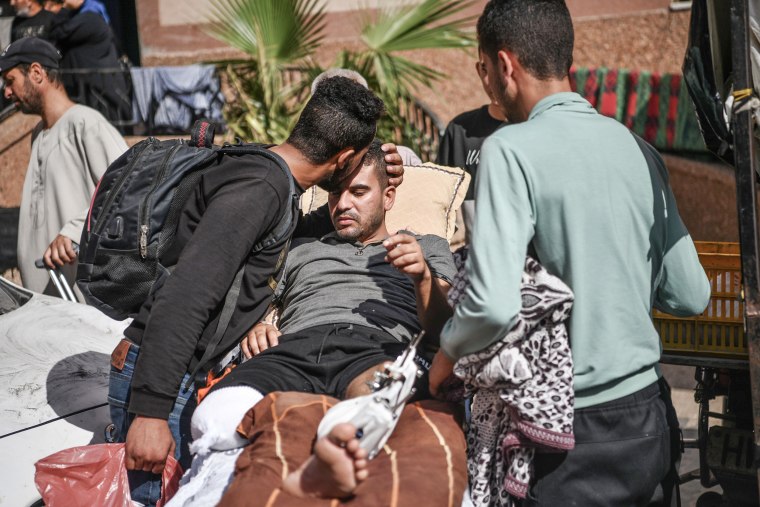
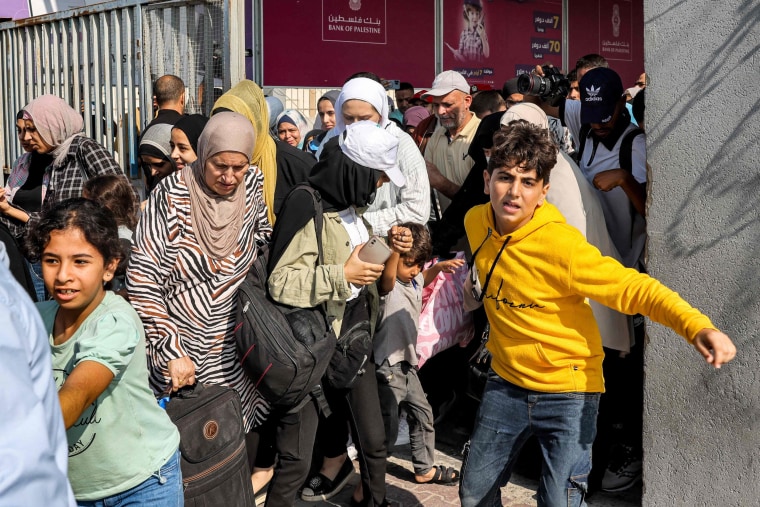
Egyptian and Palestinian officials opened the crossing to allow a number of injured civilians and an agreed-upon list of around 500 foreign nationals to evacuate. As of late Wednesday morning ET, 76 injured civilians had been taken by ambulance into Egypt and 335 foreign nationals were driven on buses through the crossing, according to Wael Abu Mohsen, head of communications for the Palestinian side of the crossing.
The crossings followed a deal involving Egypt, Hamas and Israel that was mediated by Qatar in coordination with U.S. officials, a diplomat briefed on the talks told NBC News. The deal covers several days of transfers, with Egypt controlling who gets to cross and when.
The list of foreign nationals, seen by NBC News and confirmed by a Palestinian border official, included citizens of Australia, Austria, Bulgaria, the Czech Republic, Finland, Indonesia, Jordan and Japan, as well as a group of aid workers from various countries.
Five American aid workers were on the list. A U.S. official confirmed that fewer than 10 Americans were given permission to depart through the crossing, with more set to evacuate Thursday.
State Department spokesperson Matthew Miller said a number of American citizens had already crossed into Egypt as of 1:45 pm ET.
Injured civilians were the first to officially cross the border; they were transferred from Palestinian ambulances to Egyptian ambulances just before 8 a.m. ET.
The Palestinian side of the crossing opened to foreign nationals in the morning, allowing people to gather in a holding area where they remained for several hours as officials processed their paperwork. As they moved through the gate, some families could be seen smiling and holding their children’s hands, though it was just the start of a lengthy journey.
A spokesperson for the the Egyptian Health Ministry said at about 9 a.m. ET that the first foreign nationals had officially cleared the crossing.
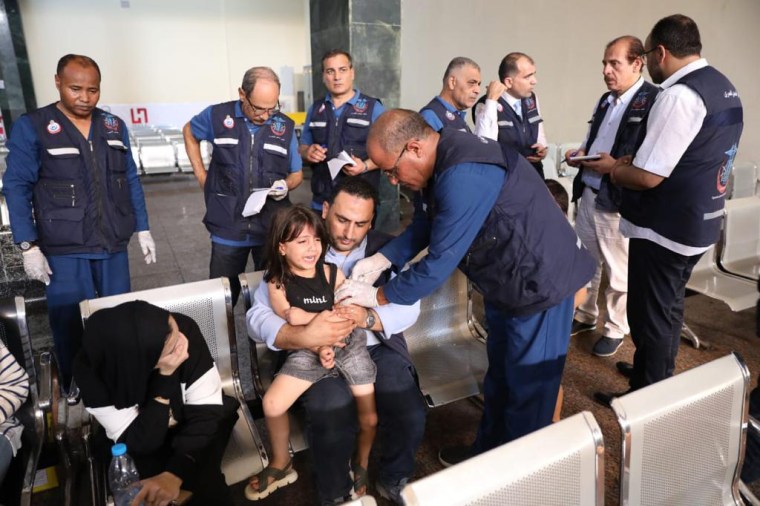
Doctors on the Egyptian side conducted examinations of 117 foreign nationals, including vaccinations for more than 30 children, the country's health ministry said. All the patients are in stable condition, it noted.
The Americans who cross will get assistance from representatives from the U.S. Embassy in Cairo, a U.S. official told NBC News, including help with travel to their final destination.
"We expect to see more depart over the coming days. We won’t let up working to get Americans out of Gaza," President Joe Biden said in a post on X.
Many people remain on the Gazan side of the crossing, waiting for news — especially the American citizens who were not included on the list allowed to depart.
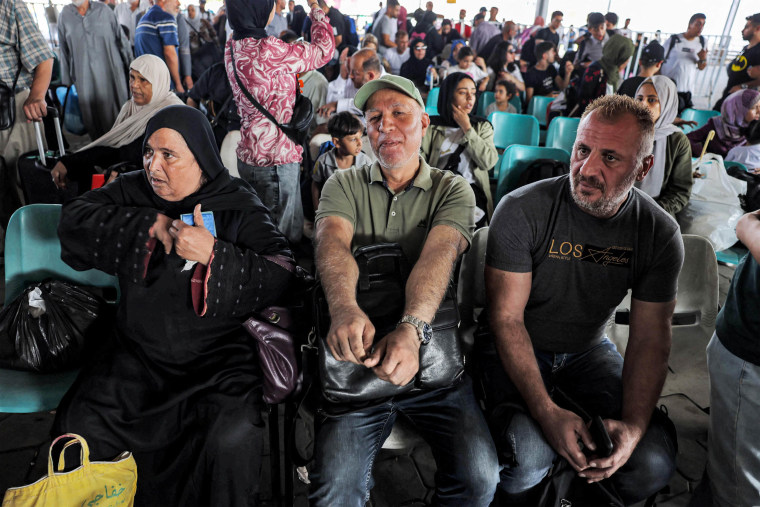
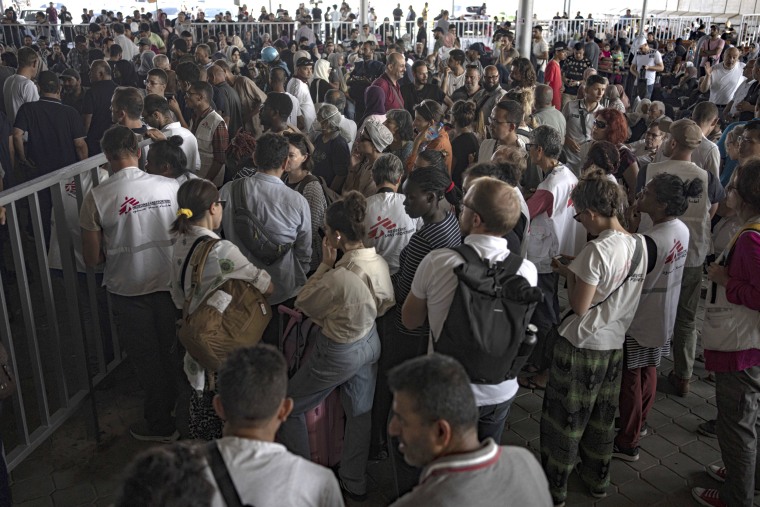
Abood Okal, a Massachusetts man who has spent weeks waiting to cross with his wife and 1-year-old son, said the limitations on who is able to leave added to his frustration.
At the same time, he said, he’s glad to see any momentum at all.
“We were contacted by State Department and informed to keep an eye for further instructions on the day/timing for our departure from Gaza,” Okal wrote in a WhatsApp message. “At least we know it’s not today.”
Although aid has been brought into Gaza in recent weeks, the daily delivery of trucks cannot keep up with the demand of more than 2 million people inside Gaza as water and food supplies dwindle. Fuel has not been allowed in since the start of the war, leaving many homes and hospitals without power or reliant on generators, while communications outages have hit repeatedly in recent days.
Palestinian health officials say more than 8,700 people have been killed in Gaza, including thousands of women and children. Israel’s increasing ground operation against Hamas has only added urgency to global calls for a cease-fire.
Lawahez Jabari reported from the Israel-Gaza border and Doha Madani from London.